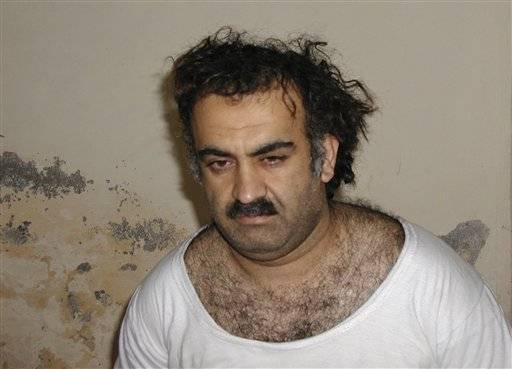9/11 suspects ask to make ‘confessions’ at Gitmo

In this file photo from March 1, 2003 obtained by the Associated Press, Khalid Sheikh Mohammed, the alleged Sept. 11 mastermind, is seen shortly after his capture during a raid in Pakistan. The mothers of two men killed in the Sept. 11 attacks are traveling to Guantanamo Bay and will be among spectators Monday Dec. 8, 2008 at a pretrial hearing for Khalid Sheikh Mohammed and four other alleged 9/11 plotters. (AP Photo, File)
December 8, 2008
GUANTANAMO BAY NAVAL BASE, Cuba (AP) — The alleged mastermind of the Sept. 11 attacks and four co-defendants told a military judge Monday they want to immediately confess at their war-crimes tribunal, setting up likely guilty pleas and their possible executions.
The five said they decided on Nov. 4, the day President-elect Barack Obama was elected to the White House, that they were abandoning all efforts to defend themselves against the capital charges. It was as if they wanted to rush toward convictions before Obama — who has vowed to end the war-crimes trials and close Guantanamo — takes office.
Khalid Sheikh Mohammed and another defendant said at their arraignment in June they would welcome execution as a path to martyrdom. But word that they were giving up their defense came as a shock to some of the victims’ families.
A select group of relatives of the 2,973 people killed on Sept. 11, 2001 were able to see the proceedings in person. Maureen Santora, of Long Island City, N.Y., whose son Christopher died responding to the World Trade Center attacks, wore a black top and black pants and clutched a photo of him in his firefighter uniform.
Alice Hoagland, of Redwood Estates, California, was there for her son Mark Bingham, who is believed to be one of the passengers who fought hijackers on the United flight that crashed in rural Pennsylvania. She said the defendants’ announcement was “like a real bombshell to me.”
She told reporters she hoped Obama, “an even-minded and just man,” would ensure the five alleged mass murderers are punished. She did not elaborate. Nine family members came to Guantanamo for the pretrial hearing but it was not immediately clear if all attended.
Abruptly reversing course on previous attempts to defend themselves in the death-penalty case, the five announced they wanted to drop all defense motions. The judge said competency hearings were pending for two of the detainees, precluding them from immediately filing pleas.
In a letter the judge read aloud in court, the five defendants said they “request an immediate hearing session to announce our confessions.”
The letter implies they want to plead guilty, but does not specify whether they will admit to any specific charges. It also says they wish to drop all previous defense motions.
The judge, Army Col. Stephen Henley, asked Mohammed and his co-defendants if they were prepared to enter a plea. All five said yes, but there was no indication when they would be allowed to do so.
Mohammed, who has already told interrogators he was the mastermind of the Sept. 11 attacks, also told the judge Monday that he had no faith in him, his Pentagon-appointed lawyers or President George W. Bush.
Sporting a chest-length gray beard, Mohammed said in English: “I don’t trust you.”
The pretrial hearings this week could be the last court appearance for the high-profile detainees at Guantanamo Bay. The first U.S. war-crimes trials since World War II are teetering on the edge of extinction. Obama opposes the military commissions — as the Guantanamo trials are called — and has pledged to close the detention center holding some 250 men soon after taking office next month.
Henley was assigned to the case after the previous judge resigned for undisclosed reasons in November. The defendants, who are representing themselves, were also expected to question Henley about whether any conflicts would prevent him from impartially overseeing the death-penalty case.
No trial date has been set, and it is all but certain none will begin before Obama takes office on Jan. 20. Still, the U.S. military is pressing forward with the case until it receives orders to the contrary.
“We serve the sitting president and will continue to do so until President-elect Obama takes office,” said Navy Cmdr. Jeffrey Gordon, a Pentagon spokesman.
Jennifer Daskal of Human Rights Watch, who is also an observer at this week’s hearings, urged Obama to try terror suspects in federal court “where attention will focus on the defendants’ alleged crimes rather than the unfairness of the commissions.”
The military commissions have netted three convictions, but have been widely criticized for allowing statements obtained through harsh interrogations and hearsay to be admitted as evidence.
The victims’ family members were expected to watch from a gallery at the rear of the cavernous, high-security courtroom and were not allowed to address the defendants.






